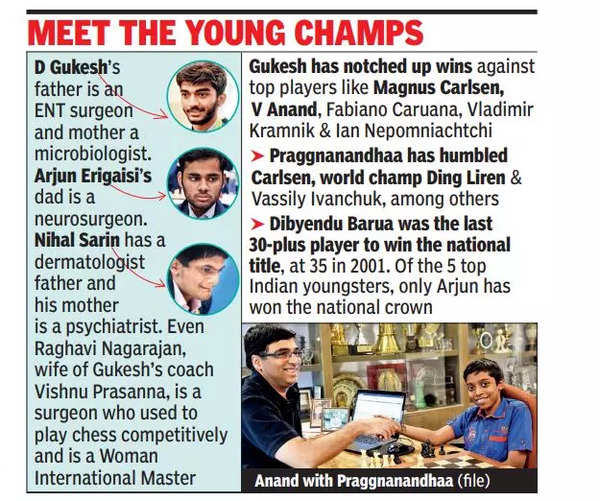For over three decades, the title of India's No.1 chess player belonged to Viswanathan Anand, the country's first Grandmaster. But come September, that tag will pass to the 17-year-old D Gukesh. Although remarkable, Anand making way for his protege does not signify a change merely at the top of Indian chess. It marks a transformation that runs deep and is taking the chess world by storm.
Consider this: There are four Indian juniors in the World Open top 50.
Gukesh is at No.8 (live rating of 2758.4), No.23 is R Praggnanandhaa (2720.8), Arjun Erigaisi (2712) is at No.30 and Nihal Sarin at No.42 (2694.2). Along with Raunak Sadhwani, Leon Luke Mendonca and Aaditya Dhingra, there are seven Indians among the world's top 20 juniors.
But cut to the post-pandemic world and India's chess juniors are now dominating the senior sections. The question marks regarding their progress have turned into an exclamation mark. So, what changed?
At first glance, two things stand out: the Covid-19 pandemic, and Anand's foray into mentorship.
Add to that chess engines and software that enable youngsters to train at the same level as the game’s stalwarts and you have a situation where the Gukeshes and Praggnanandhaas are challenging those at the top of the chess pile. Indeed, Gukesh opted not to play the juniors last year – he was 16 – because he had already reached the next level. A young and fearless India ‘B’ team led by him stole a march over India ‘A’ by winning the team Olympiad bronze at home last year.
GM Vishnu Prasanna, Gukesh’s coach, agrees that online chess during the pandemic’s peak ensured that the chess world’s elite rubbed shoulders with the secondand third-rung players. The online and shorter time control of the game has also brought speed and reflexes into play, which are to youngsters’ advantage.
“This opportunity was extremely rare. It was almost non-existent earlier,” Vishnu said. “The high frequency of online events and the exposure of playing against stalwarts of the game made youngsters a lot more confident and ready for the next leap.” In fact, none of the top Indian youngsters were in the top 100 before the pandemic.
According to Prasanna, the timing of Westbridge Anand Chess Academy (WACA), too, was perfect as the Indian teens got top-notch GM coaching, funding and mentoring that enabled them to capitalise on the transformations that were being wrought.
Anand’s involvement – identifying players for high-level training and not giving them cash – has made a big difference. The efforts are paying off already and Gukesh is set to overtake Anand on September 1 in the ratings list.
Anand is a multiple-time world champion and set the bar really high for those who followed him in India. Though that might have seemed unfair at times in the past the new generation is blazing its own trail.
If Anand was the first and only Indian so far to qualify for the Candidates cycle – back in 1991 – that is meant to find challengers to the reigning world champion, there is a freshly-minted contender in Praggnanandhaa in the same league after more than three decades. And, indeed, there may be more. That’s because Gukesh, on rating strength and other qualifying paths before January 2024, can sneak in as well into the Candidates race.


